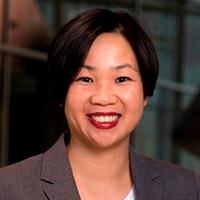Four CoE faculty receive NSF CAREER awards
Shelley Claridge, an assistant professor with a joint appointment in chemistry and biomedical engineering, is developing bioinspired surface chemistry that tailors electronic properties and solubility of technologically important layered materials such as graphene. Applications of this work range from improving efficiency of organic photovoltaic devices to designing precision biosensors. The educational component of her program uses campus dining facilities as context-rich learning environments for first-year general chemistry students.
Joyce Main, an assistant professor of engineering education, is principal investigator of an integrated research and education project examining how individual factors, institutional structures and environmental contexts converge at the PhD level to explain the longitudinal career patterns of engineering PhDs. By examining whether there are differences in career paths by gender, race/ethnicity, and engineering discipline, this research holds promise to help create engineering workforce policy and strategies that promote a competitive engineering workforce, as well as ways to strengthen academic-industry partnerships. The findings will provide doctoral programs with tools to develop training that is based on real workforce demands and student career preferences.
Michael Sangid, an assistant professor of aeronautical and astronautical engineering with a courtesy appointment in materials engineering, is principal investigator on a project studying residual stresses on polycrystalline materials. The materials such as metals, alloys and ceramics dominate the infrastructure of modern society in terms of both tons of raw material usage and in the breadth of applications, which span energy, transportation, defense, and other sectors. Stresses introduced during the processing of these materials, known as residual stresses, are ubiquitous in all materials and can have tremendous effects on performance. The research will lead to the development of a computational framework to account for residual stresses and faithfully predict their distributions. The results will unequivocally elucidate the role of residual stresses across length scales in polycrystalline materials, in order to develop more accurate lifetime predictions of the alloys and fabricate tailored components that offer either minimal or beneficial residual stresses and therefore are more resistant to failures.
Shreyas Sundaram, an assistant professor of electrical and computer engineering, will research the problem of large-scale networked systems under threat from sophisticated cyber-attacks that can compromise some of the components and cause them to behave erratically or inject malicious information into the network. The proposed research will lead to a greater understanding of the fundamental factors that affect the resilience of distributed optimization, learning, and estimation dynamics, and establish systematic procedures to design large-scale networked systems that are capable of operating in a near-optimal manner under attacks. Given the lack of existing work on this topic, the research will lay the groundwork for substantial further explorations of resilient algorithms for distributed decision-making and coordination in large-scale networks.




